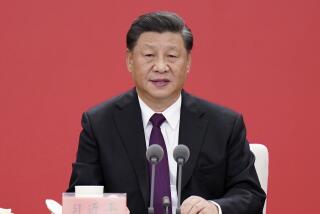Yu Chi-chung, 92; China Times Founder Offended Nationalist Party of Taiwan
- Share via
Yu Chi-chung, founding publisher of the China Times, a leading Taiwanese newspaper, has died. He was 92.
Yu died Tuesday at his home in Taipei after a long battle with liver and colon cancer, said James Tu of the China Times Group.
Now one of Taiwan’s top three news organizations, the group also includes the Commercial Times business daily, the evening China Times Express, a weekly news magazine and a book publishing company.
Born in mainland China, Yu studied at what are now Nanjing and Southeastern Universities and the London School of Economics and Political Science. During World War II, he served as an aide to a top Chinese general. At the end of the war, he participated in diplomatic talks to recover Manchuria from the occupying Soviets.
Yu started a small newspaper, the Sino-Soviet Daily, in 1946 in what is now Shenyang. But he fled the mainland along with Gen. Chiang Kai-shek and other Nationalist Chinese who settled in Taiwan as China came under Communist control in 1949.
A year later, Yu founded his newspaper, then called the Credit Information and produced it on a mimeograph machine. He sold only six copies the first day. The paper received its current name in 1968.
At its peak in the early 1980s, the China Times had a circulation of more than 1 million, and, in 1982, Yu created a U.S. edition of his newspaper with publication in New York and in Los Angeles.
Despite his membership on the Nationalist Party’s policymaking Central Standing Committee, Yu could not protect his more-liberal American edition from political scrutiny and was forced to close it in 1984.
Yu and his American edition first got into trouble over coverage of the Olympics that summer in Los Angeles, where the paper had a circulation of 10,000.
Mainland China sent athletes for the first time and won 15 gold medals. Most Taiwan news media downplayed the victories by the Communist Chinese, but Yu provided full front-page coverage.
His colleagues on the Standing Committee accused him of “making propaganda for the Communist bandits.”
The second problem was an editorial in the China Times of America criticizing President Reagan and the Republican Party platform. Nationalist Chinese leaders, who favored Reagan’s China policies, accused the paper of “hurting Sino-American relations.”
The U.S. edition was closed, official Taiwan spokesmen insisted, because of economic difficulties. But diplomats and Chinese journalists agreed the Nationalist Party silenced it.
When the Democratic Progressive Party was formed in Taiwan in 1986, Yu defied another of his government’s bans by providing full coverage in the China Times. In 2000, the party’s President Chen Shui-bian saluted Yu as “a helmsman of Taiwan’s democracy.”
The publisher, who retired only last fall after turning the China Times over to his son, Yu Chien-hsin, is survived by his wife of 60 years, the former Tsai Yu-hui; four children; and eight grandchildren.
More to Read
Sign up for Essential California
The most important California stories and recommendations in your inbox every morning.
You may occasionally receive promotional content from the Los Angeles Times.












